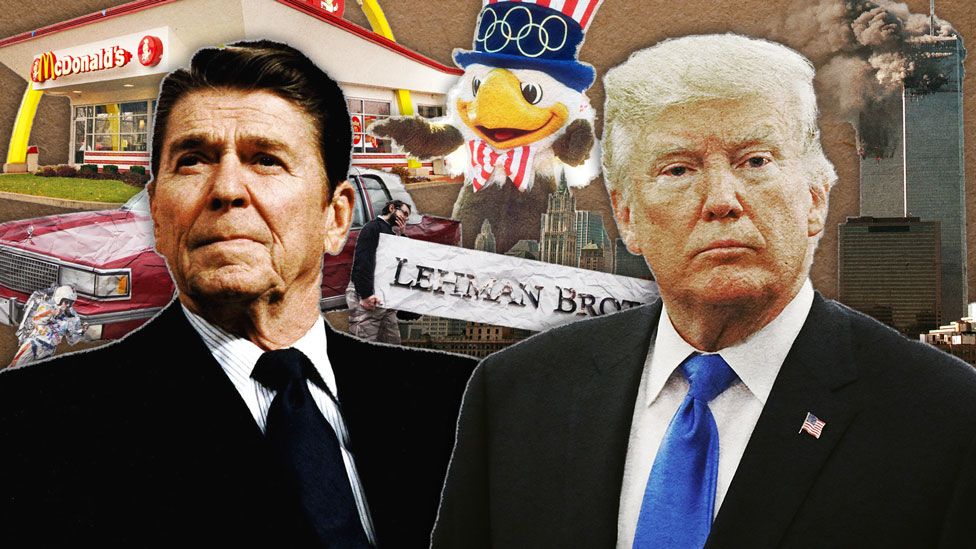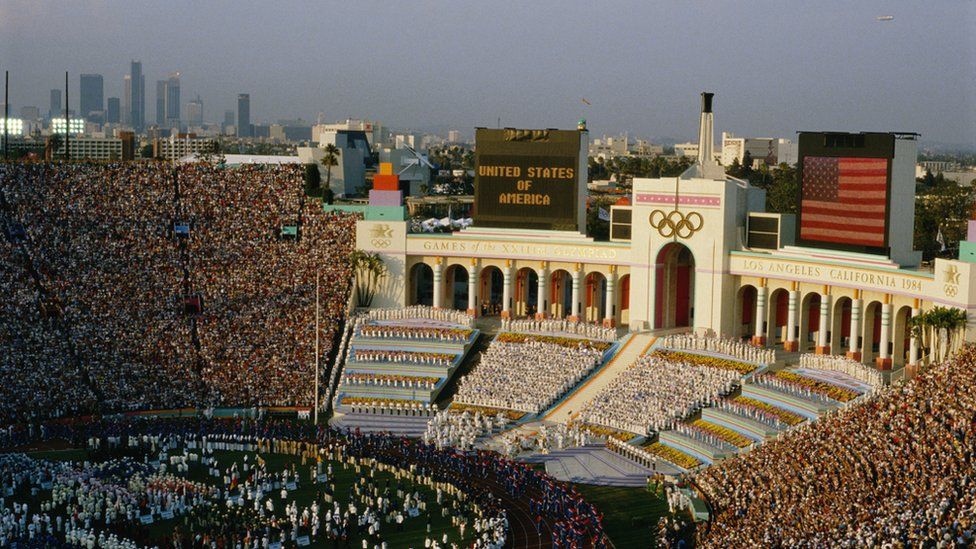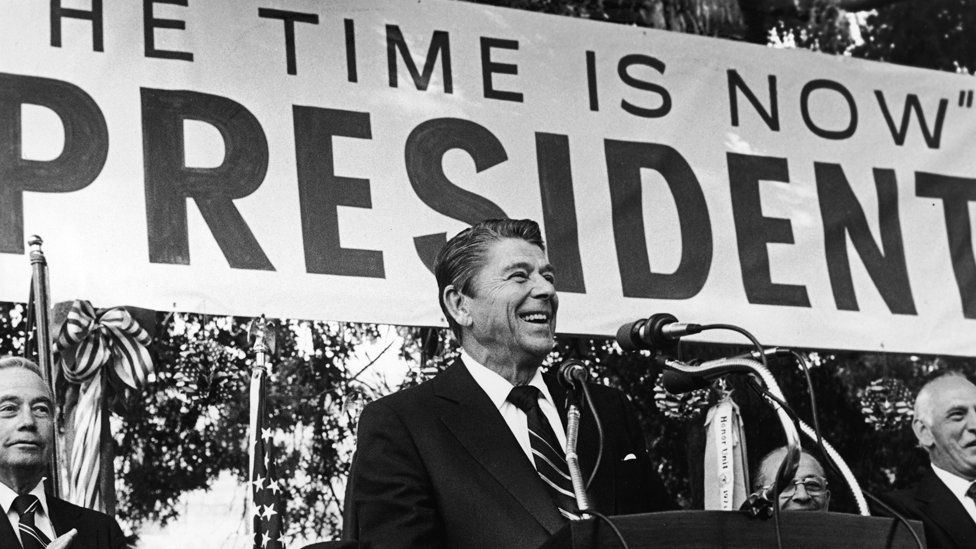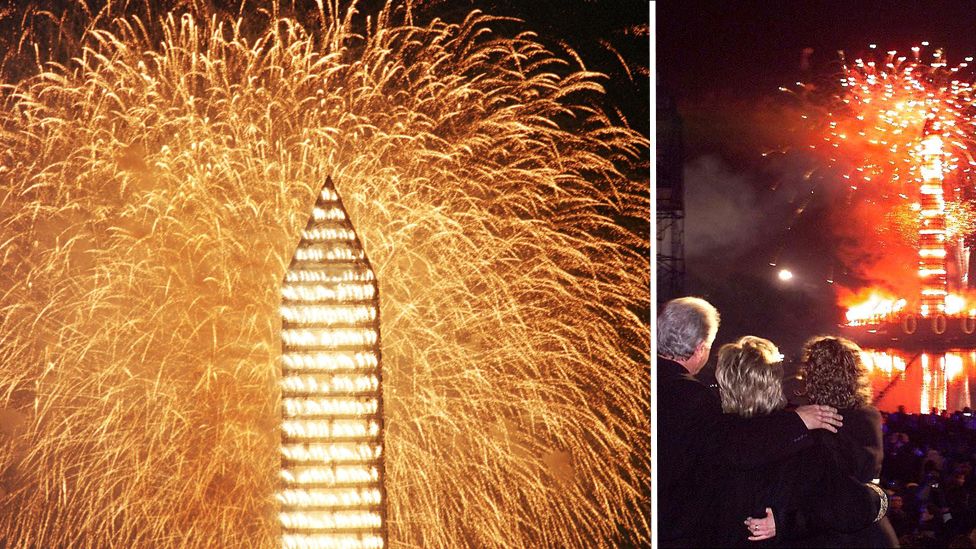Trajan
Veteran
From the BBC's Senior Foreign Correspondent

This was the flight path I followed more than 30 years ago, as I fulfilled a boyhood dream to make my first trip to the United States. America had always fired my imagination, both as a place and as an idea. So as I entered the immigration hall, under the winsome smile of America's movie star president, it was hardly a case of love at first sight.
My infatuation had started long before, with Westerns, cop shows, superhero comic strips, and movies such as West Side Story and Grease. Gotham exerted more of a pull than London. My 16-year-old self could quote more presidents than prime ministers. Like so many new arrivals, like so many of my compatriots, I felt an instant sense of belonging, a fealty borne of familiarity.
Eighties America lived up to its billing, from the multi-lane freeways to the cavernous fridges, from the drive-in movie theatres to the drive-through burger joints. I loved the bigness, the boldness, the brashness. Coming from a country where too many people were reconciled to their fate from too early an age, the animating force of the American Dream was not just seductive but unshackling.
Upward mobility was not a given amongst my schoolmates. The absence of resentment was also striking: the belief success was something to emulate rather than envy. The sight of a Cadillac induced different feelings than the sight of a Rolls Royce.
It was 1984. Los Angeles was hosting the Olympics. The Soviet boycott meant US athletes dominated the medals table more so than usual. McDonald's had a scratch-card promotion, planned presumably before Eastern bloc countries decided to keep their distance, offering Big Macs, Cokes and fries if Americans won gold, silver or bronze in selected events. So for weeks I feasted on free fast food, a calorific accompaniment to chants of "USA! USA!"


This was the summertime of American resurgence. After the long national nightmare of Vietnam, Watergate and the Iranian hostage crisis, the country demonstrated its capacity for renewal. 1984, far from being the dystopian hell presaged by George Orwell, was a time of celebration and optimism. Uncle Sam - back then, nobody gave much thought to the country being given a male personification - seemed happy again in his own skin.
For millions, it really was "Morning Again in America", the slogan of Ronald Reagan's re-election campaign. In that year's presidential election, he buried his Democratic opponent Walter Mondale in a landslide, winning 49 out of 50 states and 58.8% of the popular vote.
The United States could hardly be described as politically harmonious. There was the usual divided government. Republicans retained control of the Senate, but the Democrats kept their stranglehold on the House of Representatives. Reagan's sunniness was sullied by the launch of his 1980 campaign with a call for "states' rights", which sounded to many like a dog-whistle for denial of civil rights.

The country was in the ascendant. Not so paranoid as it was in the 1950s, not so restive as it was in the 1960s, and nowhere near as demoralised as it had been in the 1970s.
History is never neat or linear. Decades do not automatically have personalities, but it is possible to divide the period since 1984 into two distinct phases. The final 16 years of the 20th Century was a time of American hegemony. The first 16 years of the 21st Century has proven to be a period of dysfunction, discontent, disillusionment and decline. The America of today in many ways reflects the dissonance between the two.
....
In Washington, Bill Clinton's impeachment exhibited the hyper-partisanship that was changing the tenor of Washington life. In the age of 24/7 cable news, politics was starting to double as soap opera.
Shattered confidence
The national story changed dramatically and unexpectedly soon after. While doomsday predictions of a Y2K bug failed to materialise, it nonetheless felt as if the United States had been infected with a virus. 2000 saw the dot-com bubble explode. In November, the disputed presidential election between George W Bush and Al Gore badly damaged the reputation of US democracy.
Why, a Zimbabwean diplomat even suggested Africa send international observers to oversee the Florida recount. Beyond America's borders came harbingers of trouble. In Russia, 31 December 1999, as those fireworks were being primed, Vladimir Putin took over from Boris Yeltsin.

The year 2001 brought the horror of September 11th, an event more traumatic than Pearl Harbor. Post-9/11 America became less welcoming and more suspicious. The Bush administration's "war on terror" - open-ended conflicts in Afghanistan and Iraq - drained the country of blood and treasure.
The collapse of Lehman Brothers in 2008, and the Great Recession that followed, arguably had a more lasting impact on the American psyche than the destruction of the Twin Towers. Just as 9/11 had undermined confidence in the country's national security, the financial collapse shattered confidence in its economic security.
With parents no longer certain their children would come to enjoy more abundant lives than they did, the American Dream felt like a chimera. The American compact, the bargain that if you worked hard and played by the rules your family would succeed, was no longer assumed. Between 2000 and 2011, the overall net wealth of US households fell. By 2014, the richest 1% of Americans had accrued more wealth than the bottom 90%.
....
During the Obama years, Washington descended into a level of dysfunction unprecedented in post-war America.
"My number one priority is making sure President Obama's a one-term president," declared then-Senate Minority leader Mitch McConnell, summing up the obstructionist mood of his Republican colleagues. It led to a crisis of governance, including the shutdown of 2013 and the repeated battles over raising the debt ceiling. The political map of America, rather than taking on a more purple hue, came to be rendered in deeper shades of red and blue.
Beyond Capitol Hill, there was a whitelash to the first black president, seen in the rise of the Birther movement and in elements of the Tea Party movement. On the right, movement conservatives challenged establishment Republicans. On the left, identity politics displaced a more class-oriented politics as union influence waned. Both parties seemed to vacate the middle ground, relying instead on maximising support from their respective bases - African-Americans, evangelicals, the LGBT community, gun-owners - to win elections.
Throughout his presidency, Barack Obama continued to talk about moving towards a more perfect union. But reality made a mockery of these lofty words. Sandy Hook. Orlando. The spate of police shootings. The gang-related mayhem in his adopted home of Chicago. The mess in Washington. The opioid crisis. The health indices even pointed to a sick nation, in which the death rate was rising. By 2016, life expectancy fell for the first time since 1993.
...
Consider how the fall of the Berlin Wall changed Washington, and how it ushered in an era of destructive and negative politics. In the post-war years, bipartisanship was routine, partly because of a shared determination to defeat communism. America's two-party system, adversarial though it was, benefited from the existence of a shared enemy. To pass laws, President Eisenhower regularly worked with Democratic chieftains such as House Speaker Sam Rayburn and Senate Majority Leader Lyndon Johnson.
Reforms such as the 1958 National Defense Education Act, which improved science teaching in response to the launch of Sputnik, were framed precisely with defeating communism in mind.
Much of the impetus to pass landmark civil rights legislation in the mid-1960s came from the propaganda gift Jim Crow laws handed to the Soviet Union, especially as Moscow sought to expand its sphere of influence among newly decolonised African nations.
Patriotic bipartisanship frayed and ripped after the end of the Cold War. It was in the 1990s the then-Senate Minority Leader Bob Dole started to use the filibuster more aggressively as a blocking device. Government shutdowns became politically weaponised.
Click the link for more
The time when America stopped being great

This was the flight path I followed more than 30 years ago, as I fulfilled a boyhood dream to make my first trip to the United States. America had always fired my imagination, both as a place and as an idea. So as I entered the immigration hall, under the winsome smile of America's movie star president, it was hardly a case of love at first sight.
My infatuation had started long before, with Westerns, cop shows, superhero comic strips, and movies such as West Side Story and Grease. Gotham exerted more of a pull than London. My 16-year-old self could quote more presidents than prime ministers. Like so many new arrivals, like so many of my compatriots, I felt an instant sense of belonging, a fealty borne of familiarity.
Eighties America lived up to its billing, from the multi-lane freeways to the cavernous fridges, from the drive-in movie theatres to the drive-through burger joints. I loved the bigness, the boldness, the brashness. Coming from a country where too many people were reconciled to their fate from too early an age, the animating force of the American Dream was not just seductive but unshackling.
Upward mobility was not a given amongst my schoolmates. The absence of resentment was also striking: the belief success was something to emulate rather than envy. The sight of a Cadillac induced different feelings than the sight of a Rolls Royce.
It was 1984. Los Angeles was hosting the Olympics. The Soviet boycott meant US athletes dominated the medals table more so than usual. McDonald's had a scratch-card promotion, planned presumably before Eastern bloc countries decided to keep their distance, offering Big Macs, Cokes and fries if Americans won gold, silver or bronze in selected events. So for weeks I feasted on free fast food, a calorific accompaniment to chants of "USA! USA!"


This was the summertime of American resurgence. After the long national nightmare of Vietnam, Watergate and the Iranian hostage crisis, the country demonstrated its capacity for renewal. 1984, far from being the dystopian hell presaged by George Orwell, was a time of celebration and optimism. Uncle Sam - back then, nobody gave much thought to the country being given a male personification - seemed happy again in his own skin.
For millions, it really was "Morning Again in America", the slogan of Ronald Reagan's re-election campaign. In that year's presidential election, he buried his Democratic opponent Walter Mondale in a landslide, winning 49 out of 50 states and 58.8% of the popular vote.
The United States could hardly be described as politically harmonious. There was the usual divided government. Republicans retained control of the Senate, but the Democrats kept their stranglehold on the House of Representatives. Reagan's sunniness was sullied by the launch of his 1980 campaign with a call for "states' rights", which sounded to many like a dog-whistle for denial of civil rights.

The country was in the ascendant. Not so paranoid as it was in the 1950s, not so restive as it was in the 1960s, and nowhere near as demoralised as it had been in the 1970s.
History is never neat or linear. Decades do not automatically have personalities, but it is possible to divide the period since 1984 into two distinct phases. The final 16 years of the 20th Century was a time of American hegemony. The first 16 years of the 21st Century has proven to be a period of dysfunction, discontent, disillusionment and decline. The America of today in many ways reflects the dissonance between the two.
....
In Washington, Bill Clinton's impeachment exhibited the hyper-partisanship that was changing the tenor of Washington life. In the age of 24/7 cable news, politics was starting to double as soap opera.
Shattered confidence
The national story changed dramatically and unexpectedly soon after. While doomsday predictions of a Y2K bug failed to materialise, it nonetheless felt as if the United States had been infected with a virus. 2000 saw the dot-com bubble explode. In November, the disputed presidential election between George W Bush and Al Gore badly damaged the reputation of US democracy.
Why, a Zimbabwean diplomat even suggested Africa send international observers to oversee the Florida recount. Beyond America's borders came harbingers of trouble. In Russia, 31 December 1999, as those fireworks were being primed, Vladimir Putin took over from Boris Yeltsin.

The year 2001 brought the horror of September 11th, an event more traumatic than Pearl Harbor. Post-9/11 America became less welcoming and more suspicious. The Bush administration's "war on terror" - open-ended conflicts in Afghanistan and Iraq - drained the country of blood and treasure.
The collapse of Lehman Brothers in 2008, and the Great Recession that followed, arguably had a more lasting impact on the American psyche than the destruction of the Twin Towers. Just as 9/11 had undermined confidence in the country's national security, the financial collapse shattered confidence in its economic security.
With parents no longer certain their children would come to enjoy more abundant lives than they did, the American Dream felt like a chimera. The American compact, the bargain that if you worked hard and played by the rules your family would succeed, was no longer assumed. Between 2000 and 2011, the overall net wealth of US households fell. By 2014, the richest 1% of Americans had accrued more wealth than the bottom 90%.
....
During the Obama years, Washington descended into a level of dysfunction unprecedented in post-war America.
"My number one priority is making sure President Obama's a one-term president," declared then-Senate Minority leader Mitch McConnell, summing up the obstructionist mood of his Republican colleagues. It led to a crisis of governance, including the shutdown of 2013 and the repeated battles over raising the debt ceiling. The political map of America, rather than taking on a more purple hue, came to be rendered in deeper shades of red and blue.
Beyond Capitol Hill, there was a whitelash to the first black president, seen in the rise of the Birther movement and in elements of the Tea Party movement. On the right, movement conservatives challenged establishment Republicans. On the left, identity politics displaced a more class-oriented politics as union influence waned. Both parties seemed to vacate the middle ground, relying instead on maximising support from their respective bases - African-Americans, evangelicals, the LGBT community, gun-owners - to win elections.
Throughout his presidency, Barack Obama continued to talk about moving towards a more perfect union. But reality made a mockery of these lofty words. Sandy Hook. Orlando. The spate of police shootings. The gang-related mayhem in his adopted home of Chicago. The mess in Washington. The opioid crisis. The health indices even pointed to a sick nation, in which the death rate was rising. By 2016, life expectancy fell for the first time since 1993.
...
Consider how the fall of the Berlin Wall changed Washington, and how it ushered in an era of destructive and negative politics. In the post-war years, bipartisanship was routine, partly because of a shared determination to defeat communism. America's two-party system, adversarial though it was, benefited from the existence of a shared enemy. To pass laws, President Eisenhower regularly worked with Democratic chieftains such as House Speaker Sam Rayburn and Senate Majority Leader Lyndon Johnson.
Reforms such as the 1958 National Defense Education Act, which improved science teaching in response to the launch of Sputnik, were framed precisely with defeating communism in mind.
Much of the impetus to pass landmark civil rights legislation in the mid-1960s came from the propaganda gift Jim Crow laws handed to the Soviet Union, especially as Moscow sought to expand its sphere of influence among newly decolonised African nations.
Patriotic bipartisanship frayed and ripped after the end of the Cold War. It was in the 1990s the then-Senate Minority Leader Bob Dole started to use the filibuster more aggressively as a blocking device. Government shutdowns became politically weaponised.
Click the link for more
The time when America stopped being great
